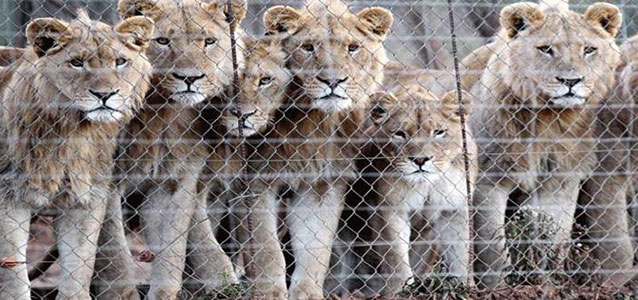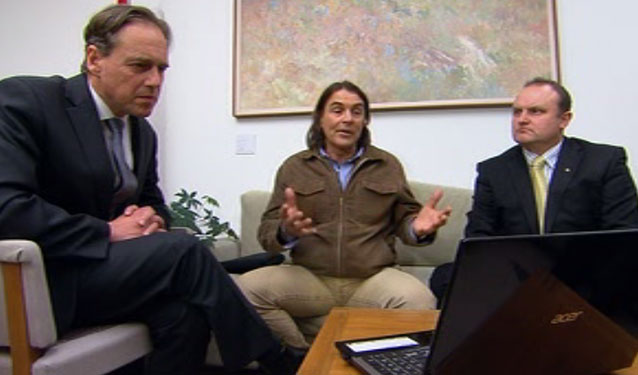 |
| Young captive-raised African lions looking out from behind chain-link fencing. |
The term "canned hunting" refers to an unethical practice of hunting in which captive-raised wild animals are released inside a large, fenced-in enclosure instead of in a wild stretch of land and ruthlessly shot to death by human hunters at a close range. This controversial mode of hunting received harsh criticism from animal rights activists and hunting organizations, who indicate that the practice eliminates the concept of fair chase. The concept of fair chase refers to a balance between the hunter and the hunted, and allows the hunter to occasionally succeed while animals usually avoid being killed. Canned hunting does not live up to this concept and consists of hunters simply pursuing a captive-raised animal in an enclosed area with nowhere to escape and killing it on the spot. It is no wonder that this barbaric practice does not sit well with hunting organizations, animal rights groups, or anybody involved in the proper safety and well-being of wild animals.
 |
| African lion |
Now, the practice of canned hunting is facing the wrath of not animal rights groups, hunting organizations, or any similar organizations but federation. This is seen in the case of the latest news about the Australian government planning to strike a major blow on South Africa's canned hunting industry. The canned hunting industry of South Africa is as appalling as any other similar industry where wild animals are raised in captivity and then released into an enclosed area destined to be killed for pleasure. In this case, the animals in danger are lions. It is said that hundreds of so-called "lion farms" in South Africa specialize in breeding lions for the purpose of this ruthless method of hunting. The way this works is that cubs are separated from their mothers at birth and raised by humans during which visitors to such facilities pay to pet and play with them. As the cubs grow older, the visitors are given the privilege of walking them. Once the cubs grow to be roughly three years of age, they are released into an enclosed area ready to be eliminated in the hands of human hunters. According to South African conservationist and anti-canned hunting campaigner Ian Michler, time and money are major issues and people want to participate in the type of hunting that promises them to kill a wild animal with unlimited success and at a cheaper rate. For example, hunters can pay $75,000 to go on a safari out in the wild to hunt a lion with no promise of a successful kill while canned hunting offers the guarantee of a kill at approximately one tenth of the price. Nonetheless, canned hunting is an extremely unethical and inhumane practice of hunting and it is even despised by Australian Minister of Environment Greg Hunt who had earlier banned the importation of rhino body parts into Australia and is now expanding that ban on the importation of lion body parts and trophies. This new ban is scheduled to be implemented by Christmas.
 |
| Australian Minister of Environment Greg Hunt with Ian Michler and member of parliament Jason Wood. |
Although I applaud the Australian government's move to impose a ban on the importation of lion body parts into Australia, I still think it would do little to put a stop to canned hunting. In addition to placing a ban on the importation of animal body parts and trophies, it is crucial to target facilities where canned hunting is being operated. Most of these facilities consist of private agricultural farms that contain lions and other exotic big game animals that had been raised in captivity and then released into enclosed areas where they are ruthlessly massacred in the hands of human hunters. The combination of imposing bans on importation of endangered exotic animal body parts and trophies, along with targeting and shutting down canned hunt facilities would greatly help in eradicating the barbaric practice of canned hunting. Apart from Australia, federal governments in other countries, including South Africa and the U.S, should also impose bans on the importation of endangered animal body parts. At the same time, they should join forces with one another in identifying and targeting facilities that conduct canned hunting, shut them down, and prosecute the proprietors and operators of this barbaric form of hunting.
View article and video here
No comments:
Post a Comment